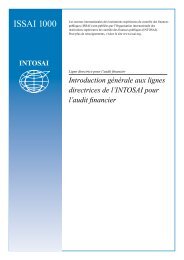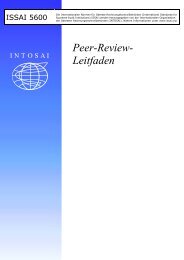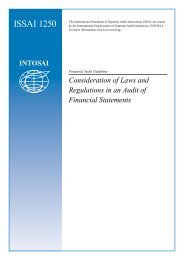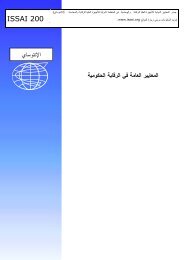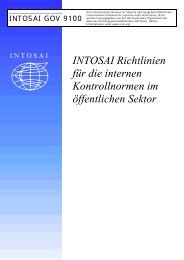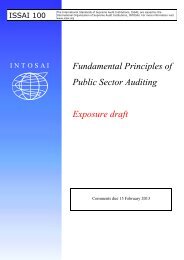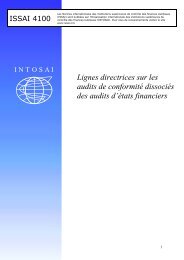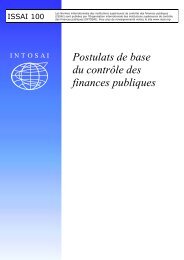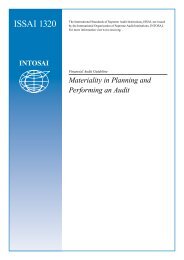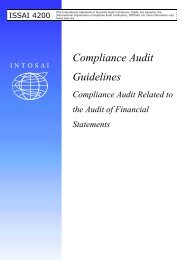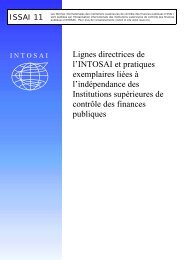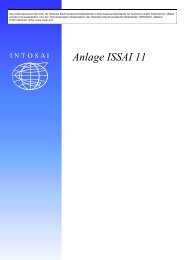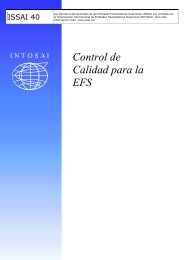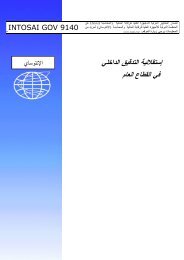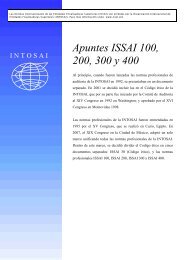ISSAI 1240
ISSAI 1240
ISSAI 1240
Create successful ePaper yourself
Turn your PDF publications into a flip-book with our unique Google optimized e-Paper software.
<strong>ISSAI</strong> <strong>1240</strong><br />
ISA 240<br />
THE AUDITOR’S RESPONSIBILITIES RELATING TO<br />
FRAUD IN AN AUDIT OF FINANCIAL STATEMENTS<br />
• A consideration of any unusual or unexplained changes in behavior or<br />
lifestyle of management or employees which have come to the attention<br />
of the engagement team.<br />
• An emphasis on the importance of maintaining a proper state of mind<br />
throughout the audit regarding the potential for material misstatement<br />
due to fraud.<br />
• A consideration of the types of circumstances that, if encountered,<br />
might indicate the possibility of fraud.<br />
• A consideration of how an element of unpredictability will be<br />
incorporated into the nature, timing and extent of the audit procedures<br />
to be performed.<br />
• A consideration of the audit procedures that might be selected to<br />
respond to the susceptibility of the entity’s financial statement to<br />
material misstatement due to fraud and whether certain types of audit<br />
procedures are more effective than others.<br />
• A consideration of any allegations of fraud that have come to the<br />
auditor’s attention.<br />
• A consideration of the risk of management override of controls.<br />
Risk Assessment Procedures and Related Activities<br />
Inquiries of Management<br />
Management’s Assessment of the Risk of Material Misstatement Due to Fraud (Ref:<br />
Para. 17(a))<br />
A12. Management accepts responsibility for the entity’s internal control and for the<br />
preparation of the entity’s financial statements. Accordingly, it is appropriate<br />
for the auditor to make inquiries of management regarding management’s own<br />
assessment of the risk of fraud and the controls in place to prevent and detect<br />
it. The nature, extent and frequency of management’s assessment of such risk<br />
and controls may vary from entity to entity. In some entities, management may<br />
make detailed assessments on an annual basis or as part of continuous<br />
monitoring. In other entities, management’s assessment may be less structured<br />
and less frequent. The nature, extent and frequency of management’s<br />
assessment are relevant to the auditor’s understanding of the entity’s control<br />
environment. For example, the fact that management has not made an<br />
assessment of the risk of fraud may in some circumstances be indicative of the<br />
lack of importance that management places on internal control.<br />
Considerations specific to smaller entities<br />
A13. In some entities, particularly smaller entities, the focus of management’s<br />
assessment may be on the risks of employee fraud or misappropriation of assets.<br />
18<br />
The Auditor’s Responsibilities Relating to Fraud in an Audit of Financial Statements 253



